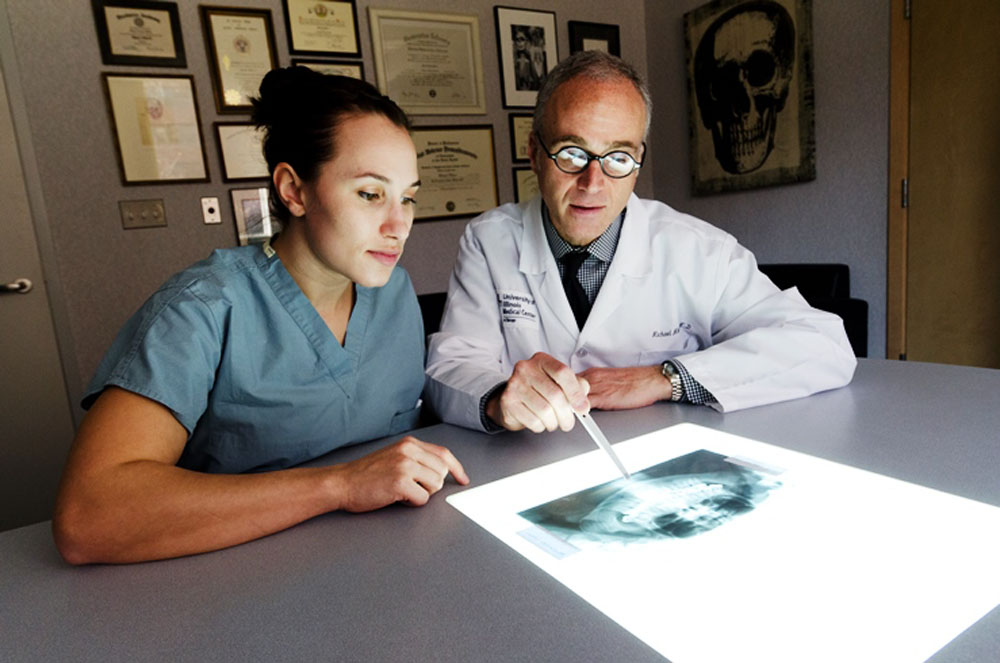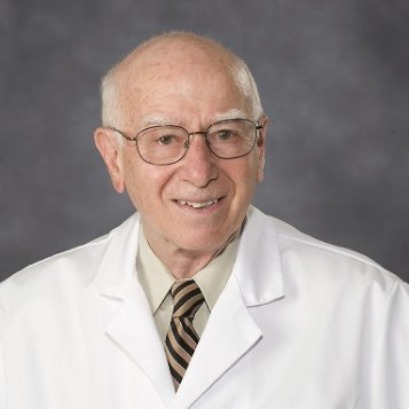Oral and Maxillofacial Surgery Residency Training Program
Certificate Programs Encompassing the Full Scope of Oral and Maxillofacial Surgery Heading link

The Department of Oral and Maxillofacial Surgery offers a comprehensive postgraduate residency training certificate program that encompasses the full scope of Oral and Maxillofacial Surgery. There is a 4-year Certificate program and a 6-year combined OMFS-MD Certificate program. The 4-year program also offers an optional Masters of Science degree (M.S.) in Oral Sciences, while the 6-year program includes a Medical degree (M.D.) and a Certificate for a one-year Internship in General Surgery. The Department of Oral & Maxillofacial Surgery also offers a range of internships, externships, observerships, and continuing education offerings.
Learn more about the Department of Oral & Maxillofacial Surgery Department
Learn more about Internships, Externships, & Observations and Continuing Education
2023 AAOMS Annual Meeting Heading link
Body Content Heading link
Column 1
Program Description
The Oral and Maxillofacial Surgery (OMS) residency training program offers two postgraduate tracks
- A 4-year OMFS Certificate program: A postdoctoral Certificate program accredited by the Commission on Dental Accreditation of the American Dental Association. The last site accreditation visit occurred in October 2017. As part of the 48 month program, the opportunity exists to pursue a Masters of Science degree (M.S.) in Oral Sciences concurrently. This program accepts two residents per year.
- A 6-year MD-integrated OMFS Certificate program: This program accepts one resident per year, with granting of a Medical degree (M.D.) and a Certificate for an Internship in General Surgery at the University of Illinois College of Medicine.
Program Objectives
- Provide a well-rounded and balanced didactic program and clinical inpatient and outpatient residency experience encompassing the full scope of Oral and Maxillofacial Surgery;
- Ensure that residents develop a solid foundation in patient evaluation, treatment planning, and management;
- Facilitate an environment for scholarly activity and collaboration, including research and publication;
- Recruit highly qualified dental students into the OMFS residency program;
- Encourage life-long learning and education;
- Train leaders in the field of Oral and Maxillofacial Surgery.
Clinical Experience
The Oral and Maxillofacial Surgery Outpatient Clinic at the University of Illinois Chicago College of Dentistry, UI Health, Jesse Brown Veterans Administration Medical Center, Northwestern Memorial Hospital, and Christ Hospital, are the current sites employed for surgical clinical experience. Thirty-six (36) months are devoted to clinical Oral and Maxillofacial Surgery. There is a comprehensive didactic curriculum consisting of weekly seminars, clinico-pathologic conferences, morbidity and mortality reviews, case reviews, oral pathology seminars, surgical-orthodontic conferences, journal club, multidisciplinary implant conferences, and head and neck tumor boards.
Clinical Experience Highlights
The OMFS clinic is located on the first floor of the UIC College of Dentistry and receives more than adequate referral of patients from the Colleges of Dentistry and Medicine, the University of Illinois itself, as well as the private practice dentists and dental specialists. Residents enjoy a diverse experience in dentoalveolar surgery and outpatient anesthesia in adults and children. There is a significant amount of implant case referrals, varying in complexity, made possible by COD grants and referrals from both the Department of Prosthodontics and the Comprehensive Dental Implant Center.
Surgical Procedures Distribution (2022-2023)
- Pathology, 25%
- Reconstructive and Cosmetic, 21%
- Orthognathic, 16%
- Trauma, 7%
- Other, 31%
Additional Educational Training and Exposure
Residents obtain various degrees of exposure to all three Fellowship areas of Oral and Maxillofacial Surgery during their training program due to the unique training of the faculty members of the Department as well as elective opportunities. This includes Head and Neck Oncologic and Microvascular Reconstructive Surgery, Cleft and Craniofacial Surgery, and Facial Aesthetic Surgery. These clinical experiences will allow the residents to determine whether they may have an interest in pursuing Fellowship training following the residency program.
There is also substantial exposure to in-house digital surgical planning for dental implants, orthognathic surgery, and reconstructive surgery. An in-house 3D laboratory with additive manufacturing capabilities and interdepartmental collaboration with various departments in the College of Dentistry augment the resident’s exposure to be adequately prepared for digital dentistry and surgery.
Research/Publication/Scholarly Activity
During his or her residency, each resident is expected to prepare and submit at least one paper to a peer-reviewed journal for publication. This paper may be the result of laboratory or clinical research, and each resident is encouraged to formulate and implement an original project beginning in their first year of training. However, significant involvement in established faculty research may satisfy this requirement. At the minimum, an abstract must be submitted to the American Association of Oral and Maxillofacial Surgeons (AAOMS) for presentation by each resident during their senior year of training. In addition, local and regional meeting presentations are encouraged and supported.
Outcomes Assessment
The program outcomes are assessed and modified on a continuous basis. Residents take the yearly OMSITE examination of the American Board of Oral and Maxillofacial Surgery (ABOMS). The UIC OMS program is designed to meet the educational requirements of the Commission on Dental Accreditation (CODA) of the American Dental Association, and to prepare the resident to obtain membership in the American Association of Oral and Maxillofacial Surgeons (AAOMS), and to obtain Board Certification by the American Board of Oral and Maxillofacial Surgery (ABOMS).
UIC residents completing the program and taking the ABOMS exam have passed at a rate comparable to the national average. Success on the ABOMS examination is a function of training, experience and, most importantly, individual preparation. However, this is only one measure of the quality of an Oral and Maxillofacial Surgery residency program.
Column 2
How To Apply
Visit the Postdoctoral Application Support Services (PASS) to register and apply.
Selection Criteria
- Academic success
- Leadership qualities
- Motivation
- Integrity
- Problem-solver
- Team-player
- Work ethic
- Professionalism
- Well-rounded
- Suitability for this program
Surgical Case Load
Available for review, by request, during the formal Interview
Benefits, Stipends and Tuition
- UIC GME House Officer health and disability benefits apply
- Vacation time consistent with UIC GME guidelines
- Stipends vary each year
- Tuition waiver for medical school (3rd and 4th years)
Graduate Medical Education Resources
Visit the UIC/UI Health Graduate Medical Education website for GME Policy Manual and other resources.
Resident Duties by Year
The first-year (48 and 72 month programs) resident spends the major portion of his or her time on the oral and maxillofacial surgery service rotating between UI Health and the Jesse Brown VA Medical Center. Residents rotate at Jesse Brown VA Medical Center for two months as an Internal Medicine resident. The resident works closely with the senior residents to provide both inpatient and outpatient care. The resident has primary responsibility for examining, diagnosing, and treating patients in the outpatient clinic. The resident also assumes responsibility for inpatients under the supervision of the chief resident, assists the chief resident and staff with operating room cases, and also serves as primary surgeon of many operative cases commensurate to their level of experience.
The second-year (48 month program) or third-year medical school (72 month program) resident functions as an intern in General Surgery for four months, and additional two months is spent as an intern in Trauma Surgery at Christ Hospital. Finally the resident spends six months as a resident in the Department of Anesthesia at UI Health, functioning as a first year resident in Anesthesiology. Residents typically perform at or above expectations per rotation based upon their periodic faculty evaluations.
The third-year (48 month program) or third-year (72 month program; 4th year medical school) or fifth-year (72 month program)resident spends his or her time functioning as a senior resident on the UIC Oral and Maxillofacial Service (OMFS) service and acting as the Chief OMFS Resident of the service at the Jesse Brown VA Medical Center.
The fourth-year (48 month program) or fourth-year (72 month program; general surgery internship) or sixth-year (72 month program) resident spends his or her time functioning as a senior OMFS resident, assuming the responsibility for the overall function of the Oral and Maxillofacial Service. The resident is expected to be the primary operating surgeon on all major cases. Responsibilities include duties at UI Health and the Oral and Maxillofacial Surgery Outpatient Clinic at UIC College of Dentistry, and Northwestern Memorial Hospital.
48-Month Program
- PGY I OMFS, 10 months
- Internal Medicine, 2 months
- PGY II General Surgery, 4 months
- Trauma Surgery, 2 months
- Anesthesia, 6 months
- PGY III OMFS, 12 months
- PGY IV OMFS, 12 months
72-Month Program
- PGY I – OMFS, 12 months
- PGY II – 3rd year, College of Medicine
- PGY III – 4th year, College of Medicine
- Anesthesia – 6 months
- PGY IV – General Surgery Internship
- OMFS – 4 months
- PGY V – OMFS, 12 months
- PGY VI – OMFS, 12 months
Faculty Research Interests
Dr. Miloro: nerve regeneration, orthognathic surgery, TMJ surgery, and resident education.
Dr. Han: orthognathic surgery, 3D imaging analysis and surgical planning, TMJ surgery.
Dr. Callahan: head and neck cancer and reconstruction, maxillofacial trauma.
Dr. Weyh: maxillofacial oncology and reconstruction.
Dr. Flick: anesthesia, public health issues.
Dr. Hussain: TMJ surgery, dental implants.
Program History Heading link

Sarnat B, Robinson I, Miloro M, Laskin DM. From the Training Programs, University of Illinois, Department of Oral and Maxillofacial Surgery J Oral and Maxillofac Surg 69: 1952-1955, 2011.
1913-Frederick B. Moorehead, DDS, MD, Head, Department of Oral and Plastic Surgery
1946-56-Bernard G. Sarnat, DDS, MD, Head, Department of Oral Surgery
1960-1973-Axel G. Andersen, DDS, Head, Department of Oral Surgery
1973-1983-Daniel M. Laskin, DDS, Head, Department of Oral Surgery
1983-1989-David I. Blaustein, DDS, Head, Department of Oral Surgery
1989-1991-Louis G. Mercuri, Head, Department of Oral Surgery
1994-2006-Leslie B. Heffez, DMD, Head, Department of Oral Surgery
2008-present-Michael Miloro, DMD, MD, FACS, Head, Department of Oral and Maxillofacial Surgery
Resources & Contacts Heading link
Resources
Contacts
For more information about Oral and Maxillofacial Surgery training programs:
Maria G. Limon, Assistant to the Head
Department of Oral and Maxillofacial Surgery (MC 835)
UIC College of Dentistry
801 South Paulina Street, Room 119G
Chicago, IL 60612-7211
(312) 996-1052
Fax (312) 996-5987